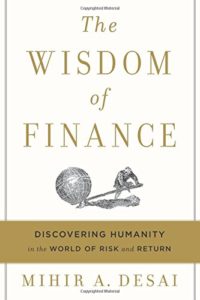 Man cannot live on finance alone. – Anonymous
Man cannot live on finance alone. – Anonymous
For those in finance it is very easy to get so focused on the field that they let their interest in the broader world wither away. That is a mistake. One way to make sure you don’t lose touch with the wider world is to read. From Farnam Street:
“Develop into a lifelong self-learner through voracious reading; cultivate curiosity and strive to become a little wiser every day.” — Charlie Munger
That is why it is unique when a book, ostensibly about finance, has broader lessons for life itself. Mihir Desai’s The Wisdom of Finance: Discovering Humanity in the World of Risk and Return is a wide-ranging romp through history, literature, philosophy and movies to find the humanity in finance. It is easy to think about finance, especially in this day of age of highly specialized, technical finance, as being something separate and apart from real life.
Life is full of risk. As is finance. The investment industry is built to induce individuals to take on more risk than they would otherwise. As Desai writes:
Finance is primarily the story of risk and its omnipresence. Insurance and risk management (options and diversification) are activities we undertake to deal with risk. Cost of capital and expected returns reflect how we charge for the risks we are asked to bear. Underneath it all, however, is the notion that risk is not something that we like to bear. That’s why we undertake risk management and charge people when we bear risk. If we were indifferent to risk, much of finance would collapse. Insurance and risk management would be unnecessary and we would not charge for risk at all. (p. 166)
The components of finance like options, futures, diversification, leverage, insurance and the principal-agent problem would be recognizable to prior generations. Desai’s book shows through historical examples and fiction that these ideas have been with humanity for centuries, if not millennia. Ideas that we struggle with today like attributing outcomes to luck and skill are long-standing issues. Desai writes:
Finance cautions against attributing outcomes to efforts and skills in a simplistic way. Luck is a dominant and underappreciated part of life and performance. The lesson of finance is one of humility-as it was for Johnson and Milton. The harshest aspects of the parable of talents-and the worldview of many practitioners of finance-can usefully be tempered with humility, generosity toward others, and a keen appreciation of the force of luck in life. (p. 74)
As computers, and the algorithms, that run on them take on an ever larger role in finance and the financial markets the human element is in relative decline. However viewed through the lens of Desai’s book that is okay. Finance is about buffeting our lives from adverse events and allowing us to take advantage of opportunities as they arise. Algorithms, like those used robo-advisors, are simply satisfying human needs we have had as long as we have had civilization. Finance is meant to serve us, not the other way around.
Wisdom isn’t about predicting what the stock market will do today, tomorrow or next year. Wisdom is applying the lessons of history to help us lead richer, fuller lives. Desai’s book does exactly that.
*I received a pre-publication version of The Wisdom of Finance from the publisher. See also this podcast with Desai and this piece on ‘optionality’ in the Harvard Crimson.








